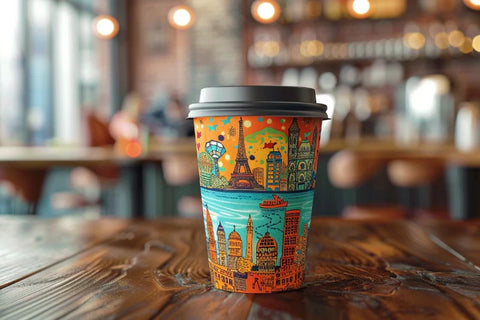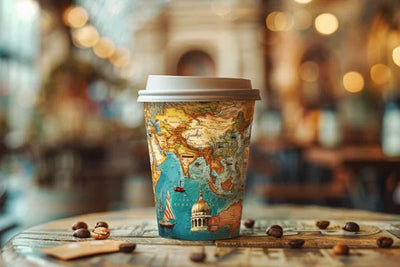Have you ever wondered which country consumes the most coffee?
Discover the top 10 coffee-loving countries, from Finland to Canada, and learn about the factors that influence their coffee consumption, such as cultural influences, economic factors, climate, and lifestyle trends.
Find out why these countries have such a strong affinity for coffee and gain insight into the global love affair with this beloved beverage.
Which Country Consumes the Most Coffee?
Coffee consumption varies across the globe, with certain countries standing out for their exceptionally high coffee intake per capita. Analyzing statistics, data, research, and surveys can provide insights into which country consumes the most coffee.
Factors contributing to high coffee consumption in these countries can range from cultural traditions and social practices to the availability and quality of coffee beans. For example, countries like Finland and Sweden are known to have a strong coffee culture, where coffee breaks are ingrained in daily routines. The rise of specialty coffee shops and the increasing popularity of coffee-related events and competitions have further fueled the demand for coffee in these regions.
Factors that Influence Coffee Consumption
Various factors influence coffee consumption patterns in different regions, including cultural norms, traditions, the prevalence of coffee shops, individual drinking habits, and preferences for warm beverages. Coffee has become a global phenomenon, embraced by enthusiasts worldwide as one of the most popular beverages.
In many cultures, the act of preparing and drinking coffee holds deep-rooted significance beyond simple refreshment. Traditional coffee-making rituals have been passed down through generations, symbolizing hospitality, social bonding, and even spiritual connections.
These rituals often involve meticulous processes, from roasting beans to brewing methods unique to each culture. Coffee shops, serving as modern hubs for social interaction, play a vital role in perpetuating these customs while also innovating new trends.
The warmth and comfort associated with a steaming cup of coffee transcend languages and borders, contributing to its enduring popularity globally.
Top 10 Coffee-Loving Countries

The top 10 coffee-loving countries stand out for their remarkable per capita coffee consumption, showcasing a deep-rooted love for this beloved beverage. These nations have earned their spots as favorites among coffee enthusiasts worldwide.
From the enduring kahve culture in Turkey to the cozy fika tradition in Sweden, coffee plays a pivotal role in daily life across these diverse countries. Countries like Finland and the Netherlands rank consistently high, emphasizing their strong coffee culture and appreciation for quality brews. Italy's rich espresso heritage and Brazil's vibrant coffee plantations further contribute to the global coffee landscape, highlighting the significance of this aromatic beverage in different corners of the world.
Finland
Finland leads the pack as the country with the highest coffee consumption per capita, reflecting a deep-rooted love for coffee ingrained in Finnish traditions. Coffee holds a special place in the hearts of Finns, making it their favorite go-to beverage.From the snowy landscapes to bustling city cafes, coffee plays a central role in everyday social interactions. It is not just about the caffeine boost but also about the social bonding that occurs over a cup of coffee. In Finland, coffee breaks are cherished moments to pause, connect, and relax. These breaks are deeply rooted in the culture, offering a chance to catch up with friends, family, or colleagues. This cultural norm of savoring coffee together has created a sense of community and belonging among Finns.
Norway
Norway secures a notable position among the top coffee-loving countries, with high coffee consumption per capita and a strong coffee culture. Social media plays a significant role in showcasing Norwegians' love for coffee, making it a favorite pastime.
Through captivating Instagram posts of beautifully crafted latte art and Twitter threads discussing the latest coffee trends, social media platforms have created an avenue for coffee enthusiasts in Norway to connect, share experiences, and discover new coffee spots. The rise of influencers promoting specialty coffee shops has also fueled the growth of the coffee scene, attracting more people to explore the rich and diverse world of coffee. As a result, coffee has evolved beyond just a beverage in Norwegian society to symbolize community, creativity, and a cherished daily ritual.
Iceland
Iceland stands out as a coffee-loving nation with a penchant for unique coffee preferences and flavors. The high per capita coffee consumption in Iceland reflects the diverse coffee culture and evolving taste preferences among its residents.Coffee enthusiasts in Iceland have a wide array of preferences when it comes to their daily cup of brew, ranging from rich and flavorful dark roasts to smooth and creamy lattes.
The influence of Icelandic culture can be seen in the popularity of traditional methods like slow-brewed coffee and the introduction of unique Icelandic ingredients like birch syrup or seaweed extracts in specialty coffees.
These cultural influences not only shape the coffee flavors but also contribute to the social aspect of coffee consumption in Icelandic society, where cozy cafes serve as community hubs for locals and tourists alike.
Denmark
Denmark's love for coffee is evident through its significant per capita consumption rates, highlighting the beverage's importance in the country's economy and industry. Coffee plays a vital role in Denmark's economic landscape and cultural fabric.
Consumption of coffee is a daily ritual for many Danes, with over 5 billion cups of coffee consumed annually in the country. This widespread coffee culture has led to the growth of numerous cafes, roasteries, and coffee shops, contributing to job creation and fostering entrepreneurship. The popularity of specialty coffee blends has also driven innovation and differentiation in the market, catering to diverse consumer preferences. The coffee industry in Denmark serves as a dynamic force fueling economic activity and showcasing the nation's affinity for this beloved beverage.
Netherlands
The Netherlands boasts a rich coffee culture marked by high per capita consumption rates and traditional coffee-drinking rituals. Coffee holds a special place in Dutch traditions, making it an integral part of social and cultural gatherings.
Dutch coffee culture extends beyond just a morning routine; it permeates throughout the day, with coffee breaks being a common practice in workplaces and homes. The Dutch take their coffee seriously, often enjoying it with a wide array of pastries such as stroopwafels or gevulde koeken.
The social aspect of coffee in the Netherlands cannot be overstated, as it serves as a bonding agent among friends and family. Whether it's catching up over a cup of koffie verkeerd or sharing a gezellig moment at a local café, coffee plays a central role in fostering connections and creating memorable experiences.
Sweden

Sweden embraces coffee as a beloved beverage, with high per capita consumption rates and a growing emphasis on health benefits and sustainability. Coffee plays a dual role in Swedish society, offering both enjoyment and wellness benefits.
Swedes prioritize quality coffee experiences, often opting for freshly roasted beans from sustainable sources. The coffee industry in Sweden has responded to this demand by promoting organic blends and fair trade practices.
Read: Fair Trade VS Direct Trade Coffee: Which Is Better For Coffee Sustainability?
Many cafes in Sweden serve specialty brews that cater to health-conscious consumers, such as oat milk lattes and low-acid coffees. Swedes understand the importance of balancing their love for coffee with environmentally friendly choices, leading to a surge in eco-friendly coffee pods and reusable cups.
This commitment to sustainability reflects a harmonious blend of tradition, innovation, and conscious consumerism.
Switzerland
Switzerland's coffee culture thrives on high per capita consumption and a vibrant coffee shop scene known for its exquisite espresso offerings. Coffee aficionados in Switzerland appreciate the art of espresso-making and indulge in the country's rich coffee traditions.
Espresso holds a special place in the hearts of Swiss coffee enthusiasts as it is not just a drink but a way of life. From sipping a strong shot of espresso in a cozy café to enjoying a leisurely coffee break with friends, the Swiss have truly embraced the coffee culture. The country's per capita consumption rates reflect the deep-rooted love for coffee, with an average Swiss person consuming around 7.9 kg of coffee per year. Coffee has seamlessly integrated itself into Swiss culinary experiences, adding a delightful and aromatic touch to both traditional and modern dishes.
Belgium
Belgium's coffee consumption reflects a deep appreciation for quality beans and diverse flavor profiles, contributing to the country's high per capita coffee intake. Coffee aficionados in Belgium savor unique blends and aromatic varieties, making coffee a cherished beverage.
This emphasis on quality beans is evident in Belgian coffee preferences, where the choice of beans greatly impacts the overall coffee experience. From rich, full-bodied dark roasts to fruity and floral light roasts, Belgians value the nuances of flavor that each bean brings. This commitment to flavor diversity extends to the country's bustling coffee culture, with specialty cafes offering a plethora of coffee options. The importance of flavor diversity in Belgian coffee traditions is not just about taste but also about celebrating the artistry and craftsmanship behind each cup.
Read: What's The Deal With Fruity Tasting Coffee?
Luxembourg
Luxembourg's coffee culture thrives on per capita consumption rates and the tradition of coffee as a catalyst for casual conversations and social interactions. Coffee plays a vital role in Luxembourg's social fabric, fostering connections and fostering community bonds.
The act of sharing a cup of coffee in Luxembourg goes beyond just enjoying a beverage; it symbolizes a moment of togetherness and camaraderie. Whether it's a morning espresso with coworkers or an afternoon Kaffi-Kaas with friends, coffee serves as a common ground for people to come together and engage in light-hearted conversations. This bonding over a cup of coffee not only strengthens personal relationships but also encourages a sense of belonging within the Luxembourgish community.
Canada
Canada's coffee scene is marked by high per capita consumption rates and a diverse range of coffee shops catering to varied preferences. Coffee holds a special place in Canadian culture, offering a wide array of choices to satisfy coffee enthusiasts.
Whether you prefer a cozy independent café or a bustling chain establishment, there is something for everyone in the vibrant coffee culture of Canada. From the bustling streets of Toronto to the laid-back vibe of Vancouver, coffee has seamlessly integrated into the daily routines of Canadians from coast to coast.
The love for coffee transcends demographics, with people across different age groups and backgrounds finding comfort and joy in that perfect cup of brew. The thriving coffee industry in Canada is a testament to how deeply rooted this beverage is in the fabric of Canadian society.
Why Do These Countries Love Coffee?

The profound love for coffee in the top 10 coffee-loving countries can be attributed to a mix of cultural norms, traditional rituals, a passion for quality coffee beans, the proliferation of cafes, and unique drinking habits that have become ingrained in the daily lifestyle of residents.
These countries have a rich history of coffee consumption that goes beyond mere caffeine intake; it's a social experience that brings people together. Whether it's the elaborate coffee ceremonies in Ethiopia, the elegant espresso culture in Italy, or the coffee breaks that punctuate Swedish workdays, each country has its own unique way of celebrating this beloved beverage.
Quality beans are considered a cornerstone of the coffee experience, with many cafes sourcing beans from specific regions and meticulously roasting them to perfection. The ambiance of cafes, from cozy neighborhood joints to trendy urban spots, plays a crucial role in fostering a deep appreciation for coffee culture and enticing patrons to become regulars.
Lifestyle choices, too, heavily influence the coffee habits of these countries, where coffee isn't just a drink but a daily ritual that reflects personal tastes and preferences.
Cultural and Historical Influences
Coffee's popularity in the top coffee-loving countries is deeply intertwined with cultural norms, historical influences, and evolving traditions that have shaped the way coffee is consumed and revered. Understanding the cultural and historical context is key to unraveling the love affair with coffee in these nations.
In countries like Italy, coffee culture dates back centuries to when coffeehouses were hubs of intellectual discourse and social interaction. The espresso, a symbol of Italian coffee culture, is consumed rapidly while standing at the counter to maintain social efficiency.
On the other hand, in countries like Ethiopia, where coffee originated, the traditional coffee ceremony is a symbol of hospitality and community bonding. These varying customs and rituals reflect the diverse ways in which coffee has woven itself into the fabric of daily life across different cultures.
Economic Factors
The economic landscape plays a crucial role in fostering a deep-rooted love for coffee in the top coffee-consuming nations, with a thriving coffee industry, robust trade relations, and high market demand for quality beans driving the consumption trends. Economic factors significantly influence the affinity for coffee within these countries.
The economic impact of coffee consumption goes far beyond just being a daily beverage choice; it directly shapes the livelihoods of millions involved in the coffee industry, from farmers to exporters. The national economy benefits from the revenue generated by coffee exports, with trade dynamics playing a pivotal role in determining the flow of coffee beans across borders. Market demand not only fluctuates based on taste preferences but is also influenced by global economic conditions, making coffee a versatile and responsive commodity in the international market."
Climate and Geography
The geographical location and climatic conditions of the top coffee-loving countries play a significant role in coffee production, bean quality, and sustainability practices. The interplay between climate, geography, and coffee cultivation influences the unique flavors and preferences observed in these regions.
The altitude, temperature, rainfall patterns, and soil composition in a coffee-growing region all contribute to the character of the coffee beans produced there. For example, high altitudes often result in slower bean maturation, leading to a denser and more flavorful bean. Specific weather conditions like consistent cloud cover or distinct dry seasons can affect the development of coffee plants and the final taste profile of the brewed coffee.
Read: Brewing at the Extreme Coffee in the Worlds Harshest Climates
Sustainability initiatives in these regions aim to preserve the natural environment and biodiversity crucial for coffee production, ensuring a long-term supply of high-quality beans.
Social and Lifestyle Trends
Social dynamics and evolving lifestyle trends among different demographic groups, including millennials and Gen Z, contribute to the enduring love for coffee in the top-consuming countries. Coffee has become a symbol of social connection and a lifestyle choice reflecting the preferences of modern generations.
As social trends continue to shape consumer behavior, the coffee industry adapts to cater to the evolving tastes and preferences of younger generations. Millennials and Gen Z, known for their focus on experience and personalization, have fueled the rise of specialty coffee shops and artisanal brewing methods. For them, coffee is not just a beverage but a means of self-expression, a ritual that enhances social interactions, and a statement of identity. This shift in perception has transformed coffee from a mere daily necessity to a lifestyle statement in contemporary societies.

